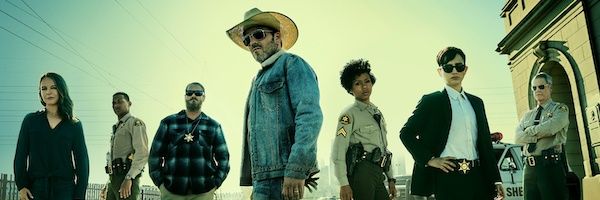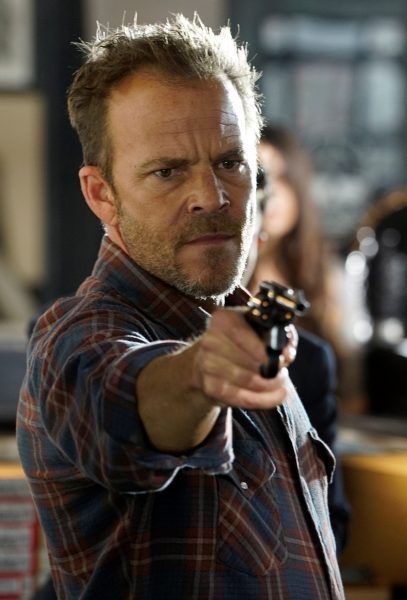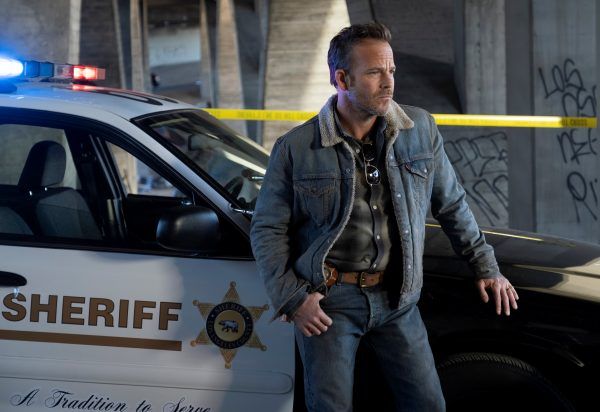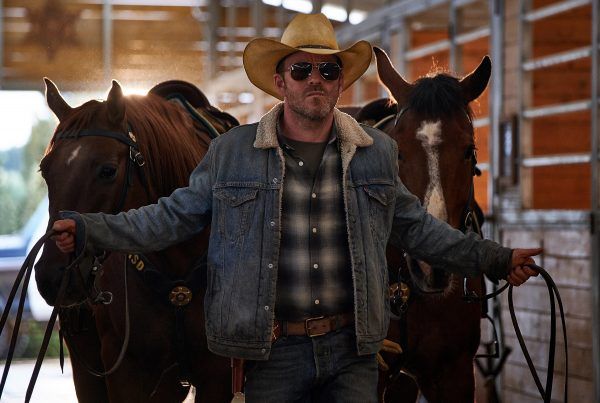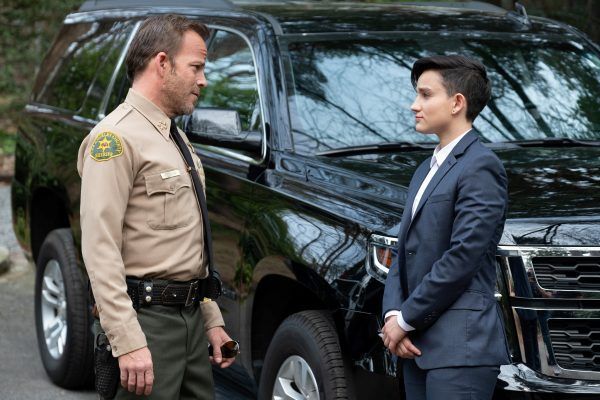The Fox drama series Deputy follows Bill Hollister (Stephen Dorff), a fifth-generation lawman who suddenly finds himself running the Los Angeles Country Sheriff’s Department when the elected Sheriff dies and a rule that dates back to the Wild West puts him in charge. And while the pursuit of justice is his number one priority, being in this new position teaches him that doing what he feels is right can ruffle more than a few feathers.
During this 1-on-1 phone interview with Collider, executive producer Kimberly Ann Harrison talked about how she came to be the showrunner on Deputy, why this story and the characters in it appealed to her, how she was able to apply her previous work on Criminal Minds and Star, what makes Bill Hollister such a fun character to center a show around, what made lead actor Stephen Dorff the perfect fit, the family dynamic, what executive producer/director David Ayer brought to the project, the biggest production challenges, and how far ahead they’ve thought about where these characters could go.
Collider: So, how did Deputy come to be for you?
KIMBERLY ANN HARRISON: Well, I came on after the pilot, to showrun the show, and it evolved from there. The origin is that it’s an urban Western crime drama, set against the gritty streets, a la David Ayer, Los Angeles County. We bounce around to different cities inside the County and get different perspectives, all through the lens of our unique characters on the show.
I love how, even though it’s modern-day, you still have a character that will get on a horse when he needs to.
HARRISON: Yes, absolutely. That’s a cool element and it gives us a great breakaway from the gritty streets. It’s a breath of fresh air, when you have Bill up on horseback, overlooking the city. It’s just a nice nod to the Western element that we’re carrying through the series.
What was it about this story and the characters that that made the material appealing to you and made you want to be a part of bringing this to audiences?
HARRISON: For me, personally, what I was attracted to was the fact that we go home with these characters and you learn a lot about law enforcement, where you don’t normally. Watching the news, you only see one side, which is at work. But with this show, you actually spend more time with these characters in their personal lives and see the challenges that they’re going through and see that they’re never off the clock. For me, that was what was most attractive about the show. They’re never off the clock, but you actually go home with these guys and see what they’re dealing with, and what they leave when they come into work to save the people of Los Angeles County, every single day. That’s what got me hooked on the show.
You were not the creator of this series, you weren’t initially the showrunner, and you came on after the pilot. Prior to stepping into the showrunner position, did you have to have a meeting to pitch your vision on the series? How does that work when the series is already in place?
HARRISON: Well, I was actually on the series as an executive producer, but I wasn’t showrunning it, at the time. I was there, from day one, of the writers’ room opening, so by the time we made the transition, I had already been on the show for the first eight weeks. I had a pretty clear vision on the show, where it was going, and the characters. I was really fortunate to have gotten in early and not be brought in, 12 weeks into the process.
You’ve previously worked on both Criminal Minds and Star, both of which seem very different from this show. Were there things that you learned from doing either of those shows that you feel made running this show easier than it would have been otherwise?
HARRISON: Absolutely! As strange as it may sound that, those were both really great training grounds – Criminal Minds for the procedural mystery element, and Star for the character elements. So, combining those two things really helped out on this show, to be able to tell that soapy throughline and these really gritty cases. So, for me, personally, it was the best of both worlds. When I was on Criminal Minds, I really wanted to work on some character stuff. And when I was on Star, I wanted to get back to the procedural. This show definitely covers personal, political and procedural, so I’m winning.
This is a fun character because he’s not somebody who’s willing to just fall in line because he’s told to. What most excites you about having a character like Bill Hollister, at the center of the story? With someone like him shaking things up a bit, does that keep things more fun for you?
HARRISON: Absolutely! Bill does things that we all wish we could do, in the workplace. All of a sudden, you find yourself the boss and there are certain things that you wanna change. Some are things that have bugged him, over the course of his time with LASD. It’s just really fun because Bill is constantly challenging older rules and doing things his way. It’s really exciting for the audience to see how he can shake things up. We refer to him as the bull in the china shop, on a weekly basis.
What do you think Stephen Dorff brings to this role? Why is he the perfect fit?
HARRISON: I think he brings relate-ability. He’s just so fantastic in this role. He’s the hero you never saw coming. That’s exactly what this character is, and Stephen just really brings Bill Hollister to life. He’s the guy you want in your corner. If things go south, you want Bill right there. Stephen just really embodies that character.
Is he someone that also has a lot to contribute, when it comes to his character? Is he very vocal about things?
HARRISON: Yes. He’s fantastic. He knows Bill, inside and out, and just really has a keen eye for storytelling. He’s just a great collaborator, always pushing the writers in the writing, and the actors. He’s such a great leader, and that is huge to the success of getting everyone on the same page. He’s at the forefront, on the ground, getting everybody going, and he’s really supportive of the stories that we’re telling.
Bill Hollister is a guy who’s clearly not afraid of or intimidated by strong women. What can you say about the relationship between Bill and his wife?
HARRISON: For the most part, on the same page. The only time it gets touchy is when it comes to their own profession, and when and when they actually have to cross. When Bill comes into the hospital, that’s the only time things might get a little messy. But at the end of the day, both Paula Reyes (Yara Martinez) and Bill Hollister are superheroes, in their field, and they are protecting Los Angeles County. There’s that mutual respect that they both have, and together they’re unstoppable. They have a mutual respect for each other. And she’s not afraid to put him in his place. What’s so lovely about Paula and [their daughter] Maggie (Valeria Jauregui) is that, while other people see him as the sheriff, to them, he’s dad and Bill. It’s always that reality check, at home.
Is it ever challenging to find that balance between his work and home life?
HARRISON: At first, there’s a balance, but as the season goes on, he’ll struggle with that. There’ll come a point where he’s realizing that his little girl is growing up, in the time that he’s been sheriff. It’s different than when he was just a deputy, and that takes a toll on everyone, not just family, but friends and some of the co-workers that he’s had in his life, since signing up for the department.
The dynamic between Bill Hollister and his security detail, Deputy Bishop, is a fun one. What you say about how that relationship evolves? What does Bex Taylor-Klaus bring to the show?
HARRISON: Going back to having people in his life that aren’t afraid to speak their mind and put him in his place, the Bishop character does that. Bishop serves as Bill’s eyes and ears, and will be there to help navigate him through his time in office. For Bill to be open to listening to someone much younger and with less experience is really important and shows what type of person Bill is.
Everything that David Ayer directs has a very visceral feeling to it. What did you like about his approach to the series and how he set things up, overall?
HARRISON: The first thing that really grabbed my attention was the way that the pilot was filmed. I haven’t seen anything like this. You really are living in the moment with these intense angles and close-ups, and you’re just really leaning forward. I found myself like really attracted to that type of storytelling. The camera work, itself, tells a story. It taps into a different feeling, as you sit there and watch it and watch TV. So, that’s what really just got me.
The action sequences on this show feel very different. Is that challenging to maintain the level of, or does it feel like it comes very natural, out of what you’re doing on the show?
HARRISON: Everybody is on the same page, from our DP to our other EPs. Everyone is on the same page of following David’s lead. This is the show that he wanted to do, and this is how he wanted it to be shot. We have to be different, and everyone is on board for that. So, it’s not challenging because we all are on the same page. That’s what makes his projects continue to be so successful. We all know what his vision is, and we’re just carrying that through.
What are biggest production challenges on a show like this? Is it just getting done everything that you want to do, in the time you have to do it?
HARRISON: It is ‘cause so much story and there are so many character moments. We have a pretty big cast and they’re all just so great. To be able to tell these detailed stories, there’s just not enough time. I wish every episode was a two-hour special. There’s just so much story and so little time.
Are there character dynamics and relationships that have most surprised you, as you’ve watched the cast together and seen them interacting with each other?
HARRISON: Yeah, they’ve been very surprising. One of the things, early on, that I wanted to make a point to do was to make sure that all of our characters interact, and I think we do a good job of that. There will be some times where I haven’t seen the characters interact in a couple of episodes, so we try to get everybody in each other’s world and have their characters connecting that you wouldn’t necessarily have cross on a, everyday basis, which makes it special. The interesting part is to be able to bring these guys in and out of each other’s worlds.
Being a showrunner on a series means that you have to be a little bit aware of everything that’s going on, everybody has questions directed to you, and holds you responsible for everything that happens, whether good or bad. When you stepped onto set, your first day as showrunner, what did that feel like? Was it something where you knew immediately that it was where you were supposed to be, or did you wonder what you’d gotten yourself into?
HARRISON: All of the above. It’s one of those things that, by the time we started shooting, we had already been in it for months and months, so I just went on autopilot. At the end of the season, when we wrap, I’ll be like, “Wow, I just did that.” It’s one of those things where you’re just so in it that you don’t have that moment. Every day, I look out the window and I’m like, “I just cannot believe this is happening.” But then, when it all comes together and you see everybody working their asses off, and you see these actors saying the lines and telling these stories, and you see the cuts, you’re like, “Wow, this is happening. This is really happening.”
Have you thought about the bigger picture of the series, as far as what will happen once this guy has to officially decide whether or not he wants to stay in this position that he’s found himself in?
HARRISON: I have thought about that. I have given thought to where we go, and I’m excited to continue to tell the stories.
How far ahead have you thought about things with this series?
HARRISON: As far as the characters go, on their personal side, we have a pretty good sense of where that goes, in seasons to come. There are ways to shake up Bill and the Hall of Justice. We have a really good roadmap of where we’d like to take everything, and there are a lot of twists and turns, ups and downs, tears, and all of that will be involved. We have a really good layout, and our staff is pretty confident that they can execute that.
Deputy airs on Thursday nights on Fox.

